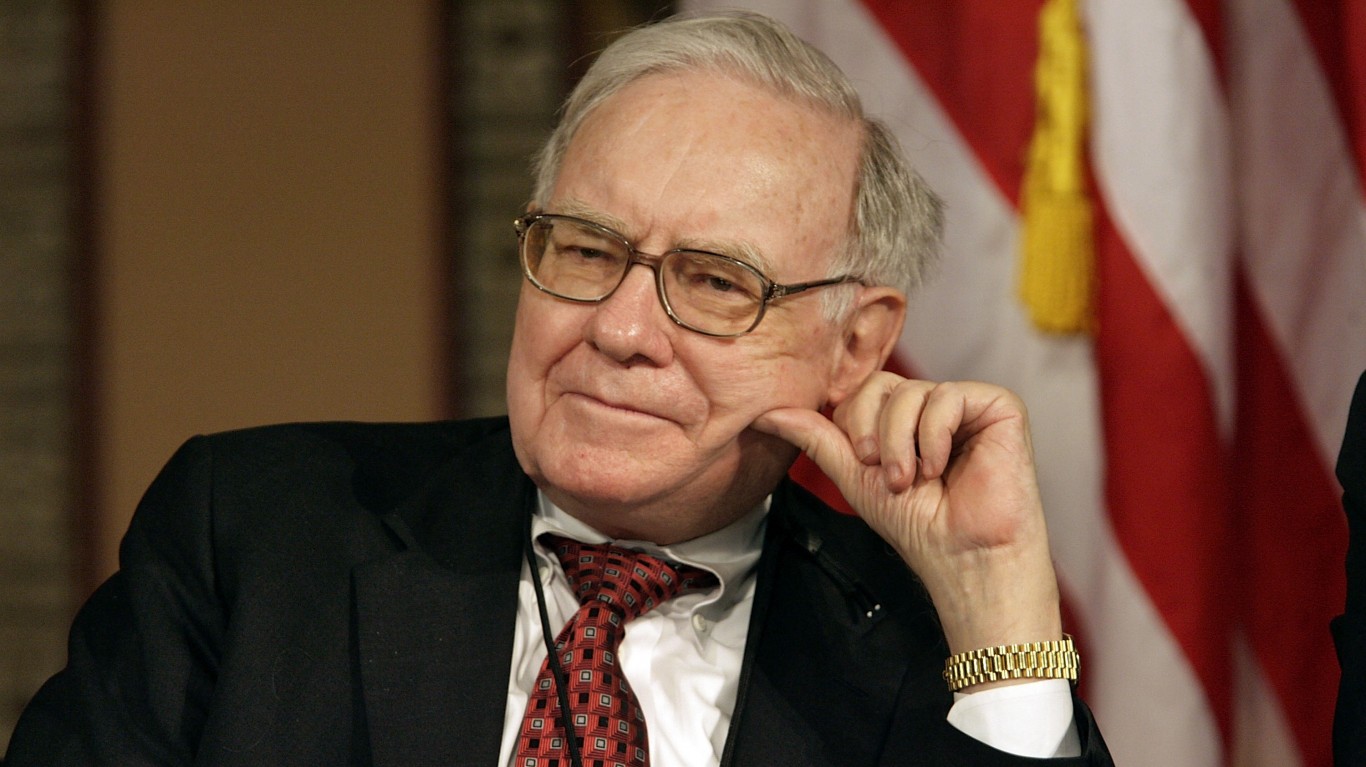
Warren Buffett is a legendary investing figure. Many investors follow his principles religiously, taking the news of his newest investments as a prophecy. But his ideas extend far beyond the stock market. Buffett is easily one of the most successful people alive and perhaps one of the happiest, too. There is a lot you can learn from him about investing and beyond.
We’ll do a deep-dive into Buffett’s ideas on risk in this article. By taking some of his best-known quotes, we’ll look at the importance of research and understanding the value of patience.
For those in a hurry, here’s a quick rundown:
- Warren Buffett’s investment principles, such as research, patience, and risk management, can be applied to all areas of your life.
- By understanding these principles, you’ll be in a better position to make informed decisions and increase your chance of success.
- Dividend stocks tend to be less risky than other stocks and should have a role in your portfolio. For specific stocks to invest in, read our free guide on “2 Dividend Legends to Hold Forever.“
Why We’re Covering This

Warren Buffett is a huge player in the financial industry, so it only makes sense to look back at him for advice. Risk is also paramount to investing, whether you’re trying to make big moves or save for retirement.
1. Risk Comes from Not Knowing What You’re Doing

Warren Buffett’s assertion that “Risk comes from not knowing what you’re doing” is a cornerstone of sound investment philosophy. It emphasizes the importance of researching and understanding the market before you decide to invest anything.
This means delving into a company’s financial statements, business model, and advantages. You need to look at the surrounding industry, too. Only when you have a comprehensive understanding of these factors should you ever invest in anything.
Otherwise, you aren’t investing; you’re gambling.
Research, Research, Research

This quote goes beyond just investing, though. Whether it’s choosing a career path, selecting a life partner, or making significant life decisions, a lack of understanding can lead to unnecessary risk. You need to research what you’re doing, just like an investor takes a careful look at each company.
By taking the time to step back and avoid impulse decisions, you can reduce the likelihood of making a mistake and increase your chance of being successful.
2. Rule Number One: Never Lose Money. Rule Number Two: Never Forget Rule Number One

The key to investing well is rather simple: don’t lose money. Of course, in practice, that is much harder. Still, it’s important to emphasize capital preservation when investing. You want to avoid substantial losses more than you want to chase outsized returns.
A loss, no matter how small, sets an investor back and can erode the foundation of wealth accumulation.
You should focus on safeguarding your principal and compounding your returns over the long term, allowing the power of time to work in your favor. This approach avoids the often-risky strategy of trying to make a quick buck right now, which can easily lead to big losses.
Take Care of Yourself

In life, you are your number one investment. Just like an investor should seek to protect their capital, you should strive to preserve yourself and your abilities. That means protecting your physical, mental, and emotional well-being. After all, you are your #1 asset.
You cannot just focus on external success, like investing.
You also shouldn’t do anything that might jeopardize your stability or security. Unnecessary risks are exactly that – unnecessary.
3. It’s Far Better to Buy a Wonderful Company at a Fair Price Than a Fair Company at a Wonderful Price

You should prioritize a business’s quality overvaluation. A company with a strong competitive advantage and sustainable earnings is far better off long-term than a mediocre business with a low stock price.
Buffett recommends acquiring exceptional companies at a reasonable price to position yourself for good gains over time.
Prioritize Quality

This principle applies to your everyday life, too. When making life decisions, prioritizing quality over immediate gratification is often wiser. For instance, you should choose a career path based on your passions and the growth potential, not the short-term financial rewards. Sure, this may work out better in the short-term, but it may come back to bite you later.
Your relationships are another area where this is true. You should build a few strong relationships over having many shallow ones.
4. The Greater the Potential for Reward in the Value Portfolio, the Less Risk There Is

This assertion is rooted in the idea that understanding a business deeply and purchasing it at a significant discount to its intrinsic value is inherently less risky than investing in speculative ventures with uncertain outcomes. True risk comes from a lack of knowledge and from choosing very discounted companies that may not have much potential.
You should invest in a company based on its potential to survive and expand, not based on its stock price alone. Sometimes, companies are worth less for a reason!
Look for undervalued companies with strong fundamentals.
Look for Challenges

In life, this principle holds similarly. You should pursue more challenging education and career paths when there is a high upside for reward. While this may seem riskier than choosing a more comfortable route, there are significant potential returns down the line.
Of course, you won’t know if there is a high upside without doing research and learning. In the end, Buffett’s quotes tend to come back to this main principle.
5. Only When the Tide Goes Out Do You Discover Who’s Been Swimming Naked

It’s very easy for people to appear successful. Periods of economic prosperity can mask underlying vulnerabilities and weaknesses. They can make anyone or any company look like it’s doing great. However, when market conditions deteriorate, those who have built their fortunes on shaky foundations are exposed.
It’s important to look for companies with sound business practices that can perform in the long term, even if market conditions deteriorate.
Don’t Confuse Prosperity with Success

It’s easy to think that you’re doing good when everything around you is going well. However, periods of ease and happiness can obscure deeper issues. Challenges can often reveal the true nature of your success, though.
This is true for personal relationships and professional life. Many people’s relationships do great when things are going well, but it only takes one glance at the divorce rate to realize that many don’t last through challenges.
Similarly, teams may work great when success is easy, but that doesn’t mean they’ll work well when crisis strikes.
6. Be Fearful When Others are Greedy and Greedy When Others are Fearful

The most profitable opportunities arise when emotions, rather than logic, dictate market behavior. Therefore, to beat the market, you have to do the opposite of what everyone else is doing.
When the majority is gripped by euphoria and greed, asset prices are likely inflated, creating a bubble ripe for bursting. A prudent investor should exercise caution and potentially reduce exposure to the market. Conversely, when panic and fear prevail, asset prices may be undervalued, presenting a golden opportunity to accumulate promising investments.
However, it’s important to note that these strategies require significant amounts of discipline and patience. It’s hard to hold the line when everyone else is selling!
Embrace Contrarian Thinking

You can embrace contrarian thinking in other parts of your life, too. For instance, when everyone is rushing into a popular field or degree, it might be worth exploring less crowded paths. You may want to look at untapped opportunities in less-hyped areas.
When societal pressures push for conformity, going against the grain might lead to more success.
7. An Investor Should Act as Though He Had a Lifetime Decision Card with just Twenty Punches on It

This quote underscores the importance of deliberate, thoughtful investment choices. Each investment decision should be treated as a precious resource, not something you can squander frivolously.
Instead, you should focus on the quality of your decisions. More decisions (aka buying and selling all the time) aren’t necessarily the best option. Instead, you should make the right decision at the right time, which requires research and self-control.
You may even want to try limiting your potential decisions, just like Warren Buffett recommends in this quote. Instead of chasing short-term gains, this forces you to build a portfolio of high-quality companies.
When each decision carries much more weight, you’re more likely to conduct rigorous research and analysis before committing capital.
Prioritize Life’s Investments

You should also see your life as having a limited number of “punches.” You’ll need to invest your time and energy wisely into the things that really matter. Deeper connections are more important than superficial interactions, for instance.
By treating your life choices as limited resources, you’re forced to become more deliberate and intentional. Instead of making impulsive decisions, you’ll have to weigh the potential impact of each choice.
In the end, this allows us to avoid FOMO and forces us to concentrate on a few deep areas of mastery.
8. It Takes 20 Years to Build a Reputation and Five Minutes to Ruin It

Your reputation is extremely fragile, and this quote emphasizes that. For many, their reputation is a key part of their personal and professional success. When too many risks are taken, there is a chance for our reputation to take a hit, especially if some of those risks go in the wrong direction.
It takes much longer to build a reputation than to destroy it, so vigilance is required. Years of hard work, integrity, and consistency can be undone in an instant by a careless mistake or a moment of poor judgment. We should absolutely avoid taking risks that put our reputation on the line when it doesn’t need to be.
The Fragility of Reputation

Of course, reputation extends far beyond the investing world. For instance, relationships rely largely on trust and reputation. It takes years to build up this reputation, but that trust can be destroyed by only one action. It’s important to protect the fragility of this trust by avoiding risky decisions that could put it in harm’s way.
Your professional career is also heavily reliant on reputation. A single ethical lapse or public scandal can jeopardize years of progress.
9. Diversification is Protection Against Ignorance

Diversification has a protective element. If you’re wrong about one company, you don’t have to worry too much if you’re diversified. All your eggs aren’t in one basket.
Investors armed with an in-depth understanding of specific industries or companies may not need to diversify as much. However, for new investors or those without in-depth knowledge, diversification can make investing much less risky.
It’s often recommended to spread investments across many classes and industries to mitigate the risk of a significant loss.
A Hedge Against Life’s Unknowns

Relying on diversification can also help you combat life’s uncertainties. Just as in investing, deep knowledge in a specific field can lead to significant rewards. A skilled surgeon, for example, can achieve extraordinary results through specialization. However, even the most skilled professionals face unforeseen challenges.
Diversifying your skills and experiences helps you build a buffer against inevitable setbacks and downturns. For instance, developing a variety of skills can increase your employability and make it easier for you to jump to a different career if necessary.
Of course, there is an essential balance to find between specialization and diversification. Focusing too broadly can prevent mastery, while excessive specialization can leave you vulnerable to market changes.
10. Never Invest in a Business You Cannot Understand

This Warren Buffett quote is a cornerstone of his strategy. It underscores the importance of research, which we’ve already discussed in depth.
When deciding what to invest in, studying the business’s advantages and financials is important. If you cannot understand the business, you can’t do this, and any investment would be akin to gambling. You must understand the business’s underlying value proposition and prospects to make an informed decision.
Ignorance can lead to costly mistakes. As we’ve discussed, investments don’t get really risky until you remove research from the equation. Without a clear grasp of the business, investors tend to be overwhelmed by market hype and misinformation.
You should concentrate on businesses within your circle of competence. Don’t try to invest in an industry you don’t understand.
Understanding Your Investments

Stocks aren’t the only things you invest in, though. It’s important to strive for informed decision-making in all aspects of your life.
For instance, you should choose a career path after you understand the rewards and demands of the job. Don’t jump into a new career without understanding what’s really involved, and don’t apply for a job you cannot do.
Invest the time into learning new skills as they make sense, but don’t jump on bandwagons for new skills that don’t have a practical application in your life. Learning for the sake of learning isn’t always the best choice.
Relationships work the same way. You should take the time to learn about the other person before committing to a deeper relationship. True friendship is built on mutual understanding, and you can’t have that without taking the time to learn about the other person.
You can use this quote to guide you to making better decisions in all parts of your life. For instance, you shouldn’t dedicate yourself to a diet or exercise routine without understanding it.
Travel Cards Are Getting Too Good To Ignore (sponsored)
Credit card companies are pulling out all the stops, with the issuers are offering insane travel rewards and perks.
We’re talking huge sign-up bonuses, points on every purchase, and benefits like lounge access, travel credits, and free hotel nights. For travelers, these rewards can add up to thousands of dollars in flights, upgrades, and luxury experiences every year.
It’s like getting paid to travel — and it’s available to qualified borrowers who know where to look.
We’ve rounded up some of the best travel credit cards on the market. Click here to see the list. Don’t miss these offers — they won’t be this good forever.
Thank you for reading! Have some feedback for us?
Contact the 24/7 Wall St. editorial team.





